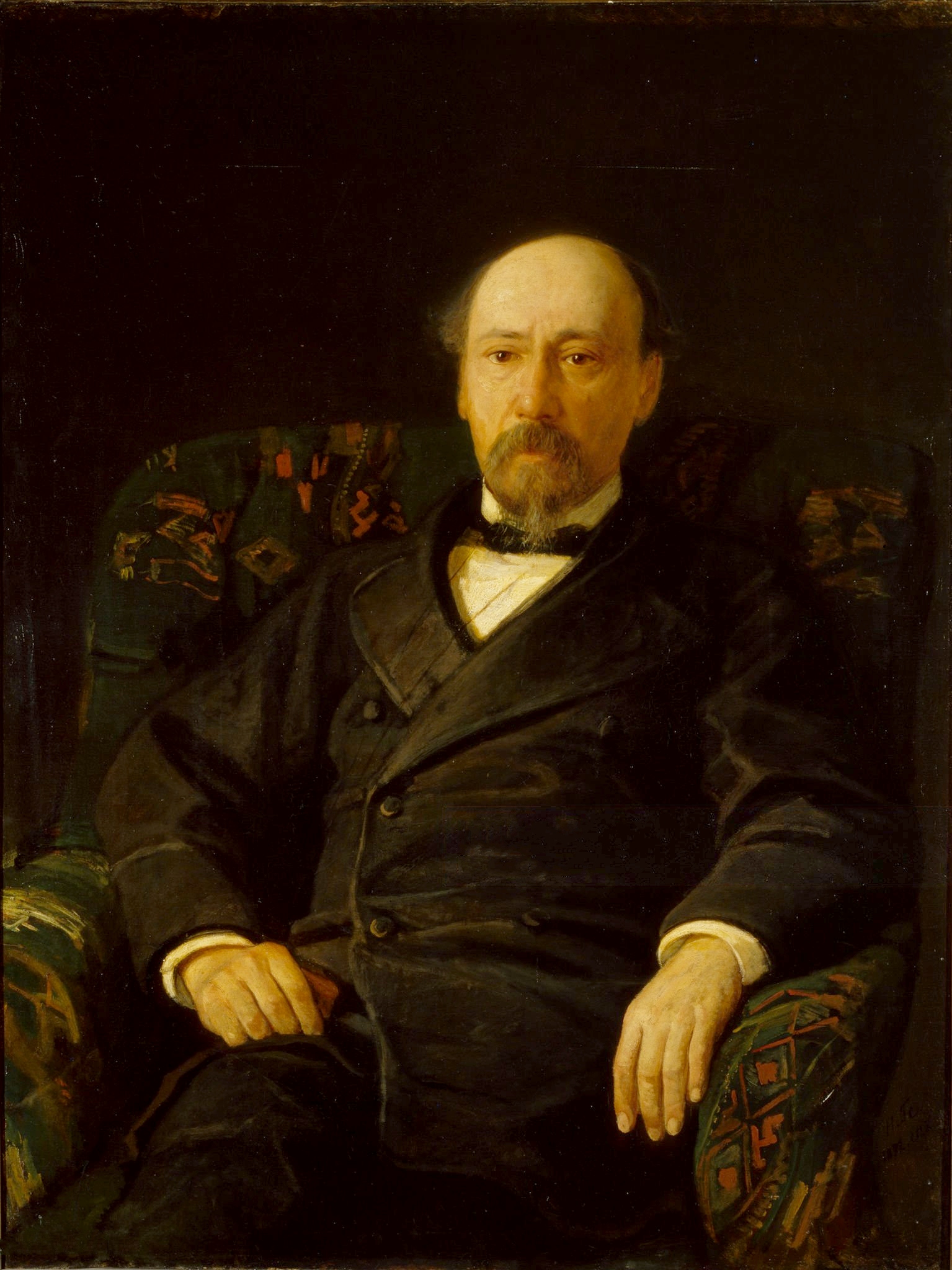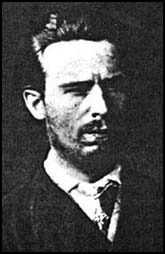|
Vasily Avseenko
Vasily Grigorievich Avseenko (, 17 .s. 5January, 1842, Moscow Governorate, - August 11 .s.July 291913, Saint Petersburg) was a literary critic, writer and journalist from the Russian Empire. Biography Vasily Avseenko was born in 1842 into a wealthy noble family. In 1852 he became a student at the first Saint Petersburg gymnasium. There, influenced by his teacher Vasily Vodovozov and senior students, Vsevolod Krestovsky among them, he started writing poetry. He published only one poem in the 1869 August issue of ''Modny Magazine'', under the pseudonym V. Poroshilov. In 1856 he joined the first Kiev gymnasium and, upon the graduation, enrolled at the St. Vladimir University in Kiev where he studied history. As a student he started publishing articles on the history of Russia and Ukraine in '' Russkoye Slovo'', 1860-1861; ''Russkaya Retch'', 1861; ''Otechestvennye zapiski'', 1863; ''The Russian Messenger'', 1863, and ''Vestnik Evropy'', 1866.Kruzhok (The Circle). A Little Memoir. ... [...More Info...] [...Related Items...] OR: [Wikipedia] [Google] [Baidu] |
:Template:Infobox Writer/doc
Infobox writer may be used to summarize information about a person who is a writer/author (includes screenwriters). If the writer-specific fields here are not needed, consider using the more general ; other infoboxes there can be found in :People and person infobox templates. This template may also be used as a module (or sub-template) of ; see WikiProject Infoboxes/embed for guidance on such usage. Syntax The infobox may be added by pasting the template as shown below into an article. All fields are optional. Any unused parameter names can be left blank or omitted. Parameters Please remove any parameters from an article's infobox that are unlikely to be used. All parameters are optional. Unless otherwise specified, if a parameter has multiple values, they should be comma-separated using the template: : which produces: : , language= If any of the individual values contain commas already, add to use semi-colons as separators: : which produces: : , pseu ... [...More Info...] [...Related Items...] OR: [Wikipedia] [Google] [Baidu] |
Dmitry Averkiev
Dmitry Vasilyevich Averkiyev (, (October 12, 1836, in Yekaterinodar, Russian Empire – January 20, 1905, in Saint Petersburg, Russian Empire) was a Russian playwright, theatre critic, novelist, publicist and translator. He is the author of the Russian libretto to ''Rogneda'' by Alexander Serov. Averkiyev's best known plays were ''Frol Skorbeyev'' (Фрол Скорбеев, 1869) and ''Old Times in Kashira'' (Каширская старина, 1872); both continued to be produced into the Soviet times. He was also an acclaimed theatre critic who contributed to '' Epokha'', '' Moskovskiye Vedomosti'', ''Novoye Vremya'' and '' Vsemirnaya Illyustratsiya'' (where he was the head of the literary section, in 1869–1871). Averkiyev's magnum opus ''On Drama'' won him the Pushkin Prize The Pushkin Prize () was a Russian literary award presented to a Russian writer considered to have achieved the highest standard of literary excellence. It was established in 1881 by the Russian Acade ... [...More Info...] [...Related Items...] OR: [Wikipedia] [Google] [Baidu] |
Vissarion Belinsky
Vissarion Grigoryevich Belinsky (; Pre-reform spelling: Виссаріонъ Григорьевичъ Бѣлинскій. – ) was a Russian literary critic of Westernizing tendency. Belinsky played one of the key roles in the career of poet and publisher Nikolay Nekrasov and his popular magazine '' Sovremennik''. He was the most influential of the Westernizers, especially among the younger generation. He worked primarily as a literary critic, because that area was less heavily censored than political pamphlets. He agreed with Slavophiles that society had precedence over individualism, but he insisted the society had to allow the expression of individual ideas and rights. He strongly opposed Slavophiles on the role of Orthodoxy, which he considered a retrograde force. He emphasized reason and knowledge, and attacked autocracy and theocracy. Biography Born in Sveaborg, part of Helsinki, Vissarion Belinsky lived in the town of Chembar (now Belinsky in Belinsky District o ... [...More Info...] [...Related Items...] OR: [Wikipedia] [Google] [Baidu] |
Nikolai Nekrasov
Nikolay Alexeyevich Nekrasov ( rus, Никола́й Алексе́евич Некра́сов, p=nʲɪkɐˈlaj ɐlʲɪkˈsʲejɪvʲɪtɕ nʲɪˈkrasəf, a=Ru-Nikolay_Alexeyevich_Nekrasov.ogg, – ) was a Russian poet, writer, critic and publisher, whose deeply compassionate poems about the Russian peasantry made him a hero of liberal and radical circles in the Russian intelligentsia of the mid-nineteenth century, particularly as represented by Vissarion Belinsky and Nikolay Chernyshevsky. He is credited with introducing into Russian poetry ternary meters and the technique of dramatic monologue (''On the Road'', 1845). As the editor of several literary journals, notably ''Sovremennik'', Nekrasov was also singularly successful and influential. Biography Early years Nikolay Alexeyevich Nekrasov was born in Nemyriv (now in Vinnytsia Oblast, Ukraine), in the Bratslavsky Uyezd of Podolia Governorate. His father Alexey Sergeyevich Nekrasov (1788–1862) was a descendant from Rus ... [...More Info...] [...Related Items...] OR: [Wikipedia] [Google] [Baidu] |
Alexander Ostrovsky
Alexander Nikolayevich Ostrovsky (; ) was a Russian playwright, generally considered the greatest representative of the Russian realistic period. The author of 47 original plays, Ostrovsky "almost single-handedly created a Russian national repertoire." His dramas are among the most widely read and frequently performed stage pieces in Russia. Biography Early years Alexander Nikolayevich Ostrovsky was born on 12 April 1823, in the Zamoskvorechye region of Moscow, to Nikolai Fyodorovich Ostrovsky, a lawyer who had received a seminary education. Nikolai's ancestors came from the village Ostrov in the Nerekhta region of the Kostroma Governorate (north-east of Moscow), hence their surname. Later Nikolai Ostrovsky became a high-ranking state official and as such in 1839 received a title of nobility with corresponding privileges. His first wife ( Alexander's mother), Lyubov Ivanovna Savvina, came from a clergyman's family. For some time the family lived in a rented flat in the Za ... [...More Info...] [...Related Items...] OR: [Wikipedia] [Google] [Baidu] |
Gogol
Nikolai Vasilyevich Gogol; ; (; () was a Russian novelist, short story writer, and playwright of Ukrainian origin. Gogol used the grotesque in his writings, for example, in his works " The Nose", " Viy", "The Overcoat", and " Nevsky Prospekt". These stories, and others such as " Diary of a Madman", have also been noted for their proto-surrealist qualities. According to Viktor Shklovsky, Gogol used the technique of defamiliarization when a writer presents common things in an unfamiliar or strange way so that the reader can gain new perspectives and see the world differently. His early works, such as '' Evenings on a Farm Near Dikanka'', were influenced by his Ukrainian upbringing, Ukrainian culture and folklore. His later writing satirised political corruption in contemporary Russia (''The Government Inspector'', '' Dead Souls''), although Gogol also enjoyed the patronage of Tsar Nicholas I who liked his work. The novel '' Taras Bulba'' (1835), the play ''Marriage'' (1842) ... [...More Info...] [...Related Items...] OR: [Wikipedia] [Google] [Baidu] |
Pushkin
Alexander Sergeyevich Pushkin () was a Russian poet, playwright, and novelist of the Romantic era.Basker, Michael. Pushkin and Romanticism. In Ferber, Michael, ed., ''A Companion to European Romanticism''. Oxford: Blackwell, 2005. He is considered by many to be the greatest Russian poet,Short biography from University of Virginia . Retrieved 24 November 2006.Allan Reid, "Russia's Greatest Poet/Scoundrel" Retrieved 2 September 2006. as well as the founder of modern Russian literature [...More Info...] [...Related Items...] OR: [Wikipedia] [Google] [Baidu] |
Demons (Dostoyevsky Novel)
''Demons'' (, ; sometimes also called ''The Possessed'' or ''The Devils'') is a novel by Fyodor Dostoevsky, first published in the journal '' The Russian Messenger'' in 1871–72. It is considered one of the four masterworks written by Dostoevsky after his return from Siberian exile, along with ''Crime and Punishment'' (1866), ''The Idiot'' (1869), and '' The Brothers Karamazov'' (1880). ''Demons'' is a social and political satire, a psychological drama, and large-scale tragedy. Joyce Carol Oates has described it as "Dostoevsky's most confused and violent novel, and his most satisfactorily 'tragic' work." According to Ronald Hingley, it is Dostoevsky's "greatest onslaught on Nihilism", and "one of humanity's most impressive achievements—perhaps even its supreme achievement—in the art of prose fiction." ''Demons'' is an allegory of the potentially catastrophic consequences of the political and moral nihilism that were becoming prevalent in Russia in the 1860s. A fictional town ... [...More Info...] [...Related Items...] OR: [Wikipedia] [Google] [Baidu] |
The Raw Youth
''The Adolescent'' (), also translated as ''A Raw Youth'' or ''An Accidental Family'', is a novel by Russian writer Fyodor Dostoevsky, first published in monthly installments in 1875 in the Russian literary magazine ''Otechestvennye Zapiski''. Originally, Dostoevsky had created the work under the title ''Discord''. The novel was not considered to be a success after its publication in Russia, and it is generally thought to be not on the same level as Dostoevsky's other major novels of the period. However, some modern critics value it highly and consider it to be one of his most underestimated works. Plot Arkady Makarovich Dolgoruky is the adopted son of the former serf Makar Ivanovich Dolgoruky and the illegitimate son of the provincial nobleman Andrei Petrovich Versilov. Having come of age he moves from the country to St. Petersburg. Versilov lives there with Arkady's mother Sofya Andreevna, and with his legitimate daughter Anna Andreyevna. Arkady is in possession of two imp ... [...More Info...] [...Related Items...] OR: [Wikipedia] [Google] [Baidu] |
Fyodor Dostoyevsky
Fyodor Mikhailovich Dostoevsky. () was a Russian novelist, short story writer, essayist and journalist. He is regarded as one of the greatest novelists in both Russian literature, Russian and world literature, and many of his works are considered highly influential Masterpiece, masterpieces. Dostoevsky's literary works explore the human condition in the troubled political, social and spiritual atmospheres of Russian Empire, 19th-century Russia, and engage with a variety of philosophical and religious themes. His most acclaimed novels include ''Crime and Punishment'' (1866), ''The Idiot'' (1869), Demons (Dostoevsky novel), ''Demons'' (1872), ''The Adolescent'' (1875) and ''The Brothers Karamazov'' (1880). His ''Notes from Underground'', a novella published in 1864, is considered one of the first works of existentialism, existentialist literature. Born in Moscow in 1821, Dostoevsky was introduced to literature at an early age through fairy tales and legends and through books by Ru ... [...More Info...] [...Related Items...] OR: [Wikipedia] [Google] [Baidu] |
Ivan Turgenev
Ivan Sergeyevich Turgenev ( ; rus, links=no, Иван Сергеевич ТургеневIn Turgenev's day, his name was written ., p=ɪˈvan sʲɪrˈɡʲe(j)ɪvʲɪtɕ tʊrˈɡʲenʲɪf; – ) was a Russian novelist, short story writer, poet, playwright, translator and popularizer of Russian literature in the West. His first major publication, a short story collection titled ''A Sportsman's Sketches'' (1852), was a milestone of Literary realism, Russian realism. His novel ''Fathers and Sons (novel), Fathers and Sons'' (1862) is regarded as one of the major works of 19th-century fiction. Life Ivan Sergeyevich Turgenev was born in Oryol (modern-day Oryol Oblast, Russia) to Russian nobility, noble Russian parents Sergei Nikolaevich Turgenev (1793–1834), a colonel in the Russian cavalry who took part in the French invasion of Russia, Patriotic War of 1812, and Varvara Petrovna Turgeneva (née Lutovinova; 1787–1850). His father belonged to an old, but impoverished Turgenev ... [...More Info...] [...Related Items...] OR: [Wikipedia] [Google] [Baidu] |
Russkiy Mir (St
The "Russian world" () is a concept and a political doctrine usually defined as the sphere of influence, sphere of military, political and cultural influence of Russia. It is a vague term, mostly used to refer to communities with a historical, cultural, or spiritual tie to Russia. This can include all ethnic Russians and Russian speakers in neighboring states, as well as those who belong to the Russian Orthodox Church. The concept of the "Russian world" is linked to Russian neo-imperialism. President Vladimir Putin established the government-funded Russkiy Mir Foundation to foster the idea of the "Russian world" abroad. The concept is sometimes also called the ''Pax Russica'', as a counterweight to the ''Pax Americana'' after WWII. History Philologist analyzed the National Corpus of the Russian Language and established that the expression "Russian world" was used only sporadically before 1930s. Later the term started being used more frequently, as he wrote, "They seem to be cha ... [...More Info...] [...Related Items...] OR: [Wikipedia] [Google] [Baidu] |








